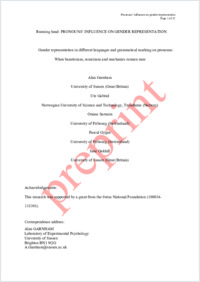Gender representation in language and grammatical cues: When beauticians, musicians and mechanics remain men. Discourse Processes, 49, 481-500.
- Garnham, Alan University of Sussex
- Gabriel, Ute Norwegian University of Science and Technology, Trondheim (Norway)
- Sarrasin, Oriane University of Fribourg
- Gygax, Pascal University of Fribourg
- Oakhill, Jane University of Sussex
-
2012
Stéréotypes des genres
Langage
représentation des genres
Gender stereotypes
Language
Generic Masculine
Gender representation
English
Gygax et al. (2008) showed that readers form a mental representation of gender that is based on grammatical gender in French and German (i.e., masculine supposedly interpretable as a generic form), but based on stereotypical information in English. In the present study, a modification of their stimulus material was used to examine the additional potential influence of pronouns. Across the three languages pronouns differ in their grammatical gender marking: the English “they” is gender neutral, the French “ils” is masculine, the German “sie” though interpretable as generic is morphologically feminine. Including a later pronominal reference to a group of people introduced by a plural role name significantly altered the masculine role name’s grammatical influence only in German, suggesting that grammatical cues that match (as in French) do not have a cumulative impact on the gender representation, while grammatical cues that mismatch (as in German) do counteract one another. These effects indicate that subtle morphological relations between forms actually used in a sentence and other forms have an immediate impact on language processing, even though information about the other forms is not necessary for comprehension and may, in some cases, be detrimental to it.
- Faculty
- Faculté des lettres et des sciences humaines
- Department
- Département de Psychologie
- Language
-
- English
- Classification
- Psychology
- License
-
License undefined
- Identifiers
-
- RERO DOC 209056
- Persistent URL
- https://folia.unifr.ch/unifr/documents/303313
Statistics
Document views: 180
File downloads:
- Texte intégral: 361
